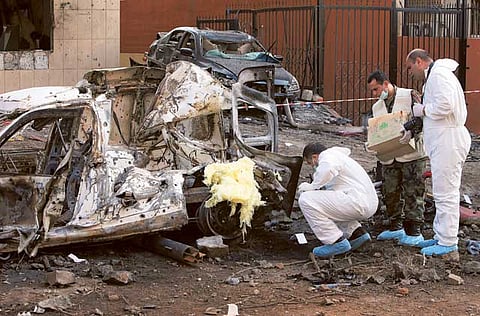How long before Lebanon breaks?
Deep polarisation amongst Lebanese over Syria has made it impossible to form a government

BEIRUT: Lebanon was reeling Wednesday a day after two powerful bombs ripped through Beirut’s Southern suburb of Jnah, killing at least 25 and injuring more than 150 in front of the Iranian Embassy. “We have entered a new stage that we consider dangerous,” a senior Hezbollah official said in comment published in the Al Jumhuriyyah newspaper on Wednesday.
The official reported that Hezbollah has taken new exceptional security measures amid rising tensions that reached the heart of the party’s stronghold. “We received the message and it’s clear and we know those who are behind it,” the official apparently claimed, emphasizing that they would not change the party’s positions on supporting the Syrian President but would further strengthen their resolve. The Abdullah Azzam Brigade, an Al Qaida-linked Sunni militant group that claimed responsibility for Tuesday’s attack, made clear the Syrian war was the motive, demanding that Hezbollah pull out its fighters. “The attack on the Iranian Embassy in Beirut was a twin martyrdom operation by two heroes of the Sunni in Lebanon,” said Shaikh Siraj Al Din Zuraiqat, a cleric affiliated with the group, in a message posted on Twitter.
Majid bin Mohammad Al Majid, the Azzam Brigade’s leader, called in August for Sunnis in Lebanon and Syria to unite against Hezbollah, which he described as the “party of Iran.” The group has claimed responsibility for firing rockets at Israel in the past. “The political situation is going into a dark tunnel,” said Lebanese resident Ebrahim Al Hajj. Lebanon still has no government since collapsing in March, and planned elections have been postponed amid wrangling over electoral laws.
“There is no state,” said Jad Kobeissi, a 36-year-old dentist who lives a block from the embassy. Few residents voiced doubt that the blast was linked to the conflict in Syria. “I was worried one day something like this would happen,” Kobeissi said. “The embassy is an obvious target.” While condemnation of the attacks were swift and resolute across the political spectrum, many Lebanese are growing increasingly frustrated with the lack of implementation of the government’s dissassiation policy towards Syria.
Since the beginning of the conflict, Lebanon’s official line has been not to get involved, however, cooperation between some Sunni Islamist groups in Syria and Lebanon and Hezbollah’s blatant military intervention to help Bashar Al Assad’s regime has catapulted Lebanon into the very conflict its been trying to avoid for over two years now.
Iranian news outlets threw out a myriad of accusations blaming Israel and Saudi Arabia of being behind the blasts - although it was highly unlikely these accusations held any real weight. Walid Jumblatt, leader of the Druze community and Socialist party, condemened the attacks and called for the resumption of national dialogue, underscoring that what was required was to ‘keep th highest levels of patriotic solidarity’ intact and to return to a national dialogue among Lebanese political parties to mediate ‘existing differences’. Jumblatt refrained from blaming any group for the bombings, concerned that the consequences of such events will only serve to further weaken the state.
The bombing was not the first in a Shiite area of Beirut. In August, an explosion in Hezbollah’s stronghold in the southern suburbs killed at least 21 people. That was followed eight days later by what was seen as a retaliatory attack on two Sunni mosques in the northern city of Tripoli, which killed more than two dozen.
Hezbollah had braced for a further attack, imposing tight security during the Shiite festival of Ashura last week, where the group’s leader, Hasan Nasrallah, made a rare appearance - and pledged to continue backing Al Assad in Syria.
Lebanese politicians condemned Tuesday’s bombings. “There is division in the country and tension, which is not helping in reducing the impact of the Syrian war on us,” lawmaker Alan Aoun told the MTV television station at the scene. “It’s causing problems, both socially and politically.”
As state power has crumbled in Syria, sectarianism has grown there and in Lebanon, where, despite their 1,400-year-old schism, Islam’s two main sects have more or less coexisted since both countries were formed from the ruins of the Ottoman Empire.
But such an accommodation is increasingly being tested in Syria and across the region, where the two sects live near each other. Iraq has suffered almost daily bombings for the past six months, nearly all of them carried out by extremist Sunni groups, who openly say they are trying to reignite the sectarian war that raged there in 2006-07.
Both Iran and Hezbollah have played lead roles in recent advances by Syrian forces around Aleppo in the north and in rebel-held land south of Damascus. Hezbollah is also believed to be at the vanguard of an offensive in the Qalamoun mountains just east of the Syrian border, which looms as a strategic battleground in the overall fight for control of the country.
With the war raging and regional tensions reverberating, Syrian political opposition leaders have yet to commit to a summit that aims to bring the crisis to a negotiated end. Opposition leaders say they remain opposed to Iran taking part and to Al Assad playing any future role in Syria.
With inputs from Washington Post and Guradian News Service
Sign up for the Daily Briefing
Get the latest news and updates straight to your inbox


